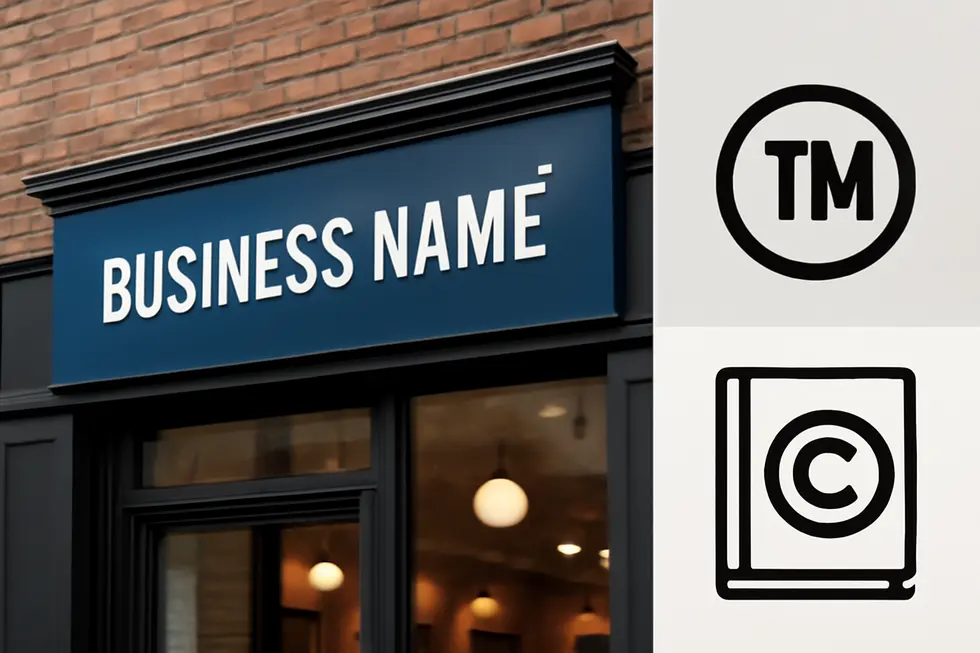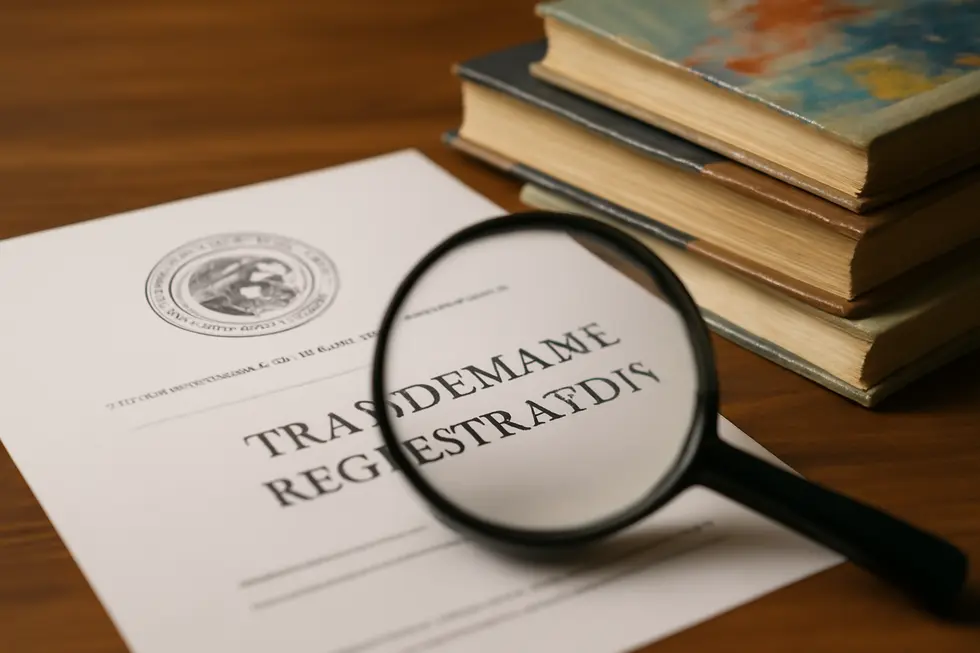Introduction
The name of your business is more than just an identifier—it’s the foundation of your brand’s identity and reputation. Many business owners wonder whether the protection of their business name lies under trademark or copyright law. This question is crucial because it determines how you safeguard your brand against misuse or infringement. Understanding whether your business name is a trademark or copyright shapes your approach to legal protection, registration, and enforcement. This article unpacks the core differences between trademark and copyright protections, explains how the law views business names, guides you through the registration process, and highlights the broader economic and societal impacts. Finally, it provides practical advice to help you determine which intellectual property protections apply to your business name and how to act accordingly.
Tables of Contents
Chapter 1: Understanding Why the Name of My Business Is a Trademark or Not a Copyright
- Decoding the Legal Boundaries: Why Business Names Are Trademarked, Not Copyrighted
- How Trademark Law Uniquely Protects Business Names as Essential Brand Identifiers
- Why Copyright Law Doesn’t Protect Business Names, Titles, or Short Phrases
- The Critical Role of Trademark Registration in Protecting Your Business Name
- Practical Steps and Legal Insights for Protecting Your Business Name as a Trademark
Chapter 2: Legal Protection Mechanisms: Is the Name of My Business a Trademark or Copyright?
- Why Business Names Receive Trademark Protection Instead of Copyright
- Essential Insights into Trademark Protection for Business Names
- Clarifying Copyright’s Limited Role: Why Business Names Rely on Trademark Protection
- Securing and Defending Your Business Name: How Trademark Registration and Enforcement Protect Your Brand
- Navigating Trademark Protection: Essential Legal Steps to Secure Your Business Name
Chapter 3: The Process and Importance of Registering the Name of My Business as a Trademark or Copyright
- Navigating the Legal Pathways to Secure Your Business Name Through Trademark Registration
- Navigating the Trademark Registration Journey: How to Secure and Protect Your Business Name
- Harnessing Economic Power and Brand Security by Registering Your Business Name as a Trademark
- Overcoming Key Technological and Procedural Hurdles in Trademark Registration for Your Business Name
- Why Registering Your Business Name as a Trademark is Key to Growth and Consumer Confidence
Chapter 4: Economic and Societal Implications of the Name of My Business Being a Trademark or Copyright
- Harnessing Trademark Power: How Business Names Drive Economic Growth and Market Leadership
- Navigating Cultural Expression and Consumer Trust Through Trademarked Business Names
- How Trademark Protection Empowers Legal Rights and Fuels Market Growth
- Balancing Innovation and Ethics: How Trademark Protection Shapes Business Identity and Consumer Trust
- How Trademarks Define Business Identity Economically and Socially, Unlike Copyrights
Chapter 5: Practical Guidance on Determining If the Name of My Business Is a Trademark or Copyright
- Clarifying Legal Protections: Why Your Business Name Is a Trademark, Not a Copyright
- Navigating Trademark Searches: Identifying If Your Business Name Is Legally Available
- Decoding Trademark Search Results: Legal Insights and Economic Value Behind Your Business Name
- Navigating Trademark Registration and Symbol Use to Protect Your Business Name
- Navigating Trademark Searches and Legal Expertise to Secure Your Business Name
Chapter 1: Understanding Why the Name of My Business Is a Trademark or Not a Copyright

1. Decoding the Legal Boundaries: Why Business Names Are Trademarked, Not Copyrighted
The name of a business serves as a unique identifier that distinguishes its goods or services in the marketplace. Legally, this identity falls under trademark protection, which safeguards brand elements like business names, logos, and slogans from being used by others in confusingly similar ways. Trademark rights arise from actual use in commerce and can be strongly reinforced through registration with the USPTO, granting exclusive rights and legal tools to prevent infringement. Conversely, copyright protects original creative expressions fixed in a tangible form—such as written content, artwork, or music—but explicitly excludes names, titles, and short phrases, which are considered too minimal to merit copyright. Thus, your business name is not protected automatically by copyright, but its value as a brand asset is secured through trademark law. For more insights on protecting your business name and logo, see this detailed trademark protection for business names and logos.
2. How Trademark Law Uniquely Protects Business Names as Essential Brand Identifiers
The name of a business functions fundamentally as a trademark because it identifies the source of goods or services in the marketplace, distinguishing it from competitors. Trademark law is designed to protect these brand identifiers—business names, logos, slogans, and other elements—by granting exclusive rights to their use in commerce. This legal protection helps prevent confusion among consumers and safeguards the company’s reputation and market position. Unlike copyright, which protects original creative expressions fixed in a tangible form, trademark law extends to words or phrases that serve a function in commerce rather than artistic creation. Businesses often use the ™ symbol to signal an unregistered trademark, but full legal rights come with registration through government authorities like the USPTO. Proper trademark protection not only strengthens brand recognition but also allows legal recourse against infringement, preserving a business’s identity and value. For a deeper insight into trademark protection of business names, see Trademark Protection for Business Name & Logo.
3. Why Copyright Law Doesn’t Protect Business Names, Titles, or Short Phrases
Business names are safeguarded through trademark law, not copyright. Copyright protects original creative works like books, music, and art fixed in a tangible form, but explicitly excludes names, titles, and short phrases. These elements are too brief and functional to qualify as original expressions under copyright law. Instead, trademarks cover words, symbols, or designs that identify and distinguish the source of goods or services. Business names fall squarely into this category since their primary role is to signal brand identity to consumers. While you can use the ™ symbol to claim common law rights over your business name, stronger protection comes from federal trademark registration, enabling the ® symbol and legal enforcement. Unlike copyright protection that has a fixed term linked to the author’s life, trademark rights can last indefinitely, as long as the mark is used and maintained. For further insight on how trademark protection applies to business names, see trademark protection business name logo.
4. The Critical Role of Trademark Registration in Protecting Your Business Name
A business name is protected under trademark law because trademarks safeguard identifiers that distinguish goods or services in commerce. Unlike copyright, which protects creative works such as books or artwork, trademarks protect words, logos, or slogans that represent a brand. Securing a registered trademark grants you exclusive nationwide rights to use your business name, strongly preventing others from using identical or confusingly similar names. This legal registration not only provides enforceable rights in federal court but also enhances your brand’s market value and recognition. While the ™ symbol signals a claimed trademark right, only registration with the USPTO allows the use of ®, providing stronger legal protection and remedies. To avoid conflicts, conducting a thorough trademark search before applying is essential. For businesses seeking reliable protection of their names and brand identity, pursuing trademark registration is a necessary and valuable measure. For additional details on legal protections, review the guide on trademark protection for business names and logos.
5. Practical Steps and Legal Insights for Protecting Your Business Name as a Trademark
Protecting a business name requires recognizing that trademarks—not copyrights—safeguard brand identifiers like names, logos, and slogans used in commerce. To secure this protection, business owners should conduct a thorough trademark search to avoid conflicts with existing marks. Applying for registration with the USPTO formalizes exclusive rights, allowing use of the ® symbol, while unregistered marks use TM to signal claimed rights. Unlike copyrights, which protect original creative works but not names or short phrases, trademarks maintain distinctiveness and prevent consumer confusion. Consulting an intellectual property attorney can guide you through the registration process and enforcement strategies. Ensuring your business name is trademarked adds value, strengthens brand identity, and provides essential legal recourse against unauthorized use. For more detailed guidance on trademark protection, see this resource on trademark protection for business names and logos.
Chapter 2: Legal Protection Mechanisms: Is the Name of My Business a Trademark or Copyright?

1. Why Business Names Receive Trademark Protection Instead of Copyright
Understanding the distinction between trademark and copyright is essential when protecting your business name. Business names function as brand identifiers that distinguish your goods or services in the marketplace, making trademark law their natural protector. Trademarks cover not only business names but also logos, slogans, and symbols that signify your brand’s unique source. Conversely, copyright protects original creative works like books, music, and artwork—but explicitly excludes names, titles, or short phrases. This means your business name is not eligible for copyright protection by itself. Using the ™ symbol can assert common-law trademark rights, but stronger, federally enforceable protection comes from registering your trademark with the USPTO. This registration grants you exclusive legal rights and helps prevent others from using confusingly similar marks. For a comprehensive approach and to avoid conflicts, conducting a thorough trademark search before registration is critical. For more insights into trademark protections for business names and logos, see trademark protection for business names and logos.
2. Essential Insights into Trademark Protection for Business Names
The name of your business is inherently protected under trademark law rather than copyright. Trademarks guard names, logos, slogans, and other identifiers that distinguish your goods or services in the marketplace. This protection applies once your name is used in commerce as a source identifier. While you can assert trademark rights by marking your name with the TM symbol, formal registration with the U.S. Patent and Trademark Office (USPTO) provides stronger legal protection, including the exclusive right to use the ® symbol.
In contrast, copyright law protects original creative works such as books, music, and artwork, but it does not cover business names or short phrases, as these are not considered creative expressions fixed in a tangible medium. To protect your business name effectively, you should conduct a thorough trademark search and then file for trademark registration. This process not only secures your legal rights but also enhances your brand’s commercial value and recognition. For detailed guidance on trademarking your business name and logo, consider exploring resources like trademark protection business name logo.
3. Clarifying Copyright’s Limited Role: Why Business Names Rely on Trademark Protection
Copyright safeguards original creative works fixed in a tangible form, such as books, music, or software. It protects the unique expression of ideas but does not cover names, titles, or short phrases used to identify a business. Conversely, a business name serves as a distinct brand identifier protected under trademark law. Trademarks help consumers distinguish goods or services by protecting names, logos, and slogans in commerce. While artistic elements like logo designs may receive copyright protection, the name itself can only be protected as a trademark. Establishing trademark rights through use and registration provides the stronger legal foundation to prevent unauthorized use and build brand equity. For deeper understanding of copyright’s role and limits in business contexts, see copyright information example for business.
4. Securing and Defending Your Business Name: How Trademark Registration and Enforcement Protect Your Brand
Protecting your business name effectively requires understanding the trademark registration and enforcement process. Registration begins with a thorough search to ensure your chosen name is unique within your industry. Selecting the right classification for your goods or services is essential to define the scope of protection. After filing your application with the appropriate authority, such as the USPTO, it undergoes examination and public opposition. Once approved, the registration grants you exclusive rights to use your business name in commerce, marked by the ® symbol.
However, registration is only the first step; active enforcement safeguards your trademark’s value. Monitoring potential infringements through specialized tools and responding promptly, often with legal counsel, helps prevent dilution or unauthorized use. Complementary measures like securing related domain names and social media handles strengthen your brand’s online presence and reduce the risk of confusion. For businesses aiming to fortify their name legally, these strategies form an integrated defense that sustains recognition and trust. Explore more on protecting brand elements in the comprehensive resource on trademark protection for business names and logos.
5. Navigating Trademark Protection: Essential Legal Steps to Secure Your Business Name
A business name is inherently protected under trademark law, not copyright. Trademarks shield names, logos, and slogans that identify and distinguish a business’s goods or services in commerce. While copyright safeguards original creative works, it does not extend to business names or short phrases. To ensure exclusive rights to your business name, registering it as a trademark with the USPTO is highly recommended. Registration grants stronger legal enforcement and the ability to use the ® symbol, signaling official protection. Prior to filing, conducting a thorough trademark search helps ensure your chosen name does not conflict with existing marks, reducing legal risks. Consulting an intellectual property attorney can clarify registration nuances and enforceability. This strategic approach not only protects your brand identity but also enhances consumer trust and business value. For detailed guidance on securing trademark rights for your business name, visit trademark2go.com/trademark-protection-business-name-logo/.
Chapter 3: The Process and Importance of Registering the Name of My Business as a Trademark or Copyright

1. Navigating the Legal Pathways to Secure Your Business Name Through Trademark Registration
Registering your business name as a trademark grants exclusive legal rights to use that name, logo, or slogan in connection with your goods or services. This protection prevents competitors from adopting confusingly similar marks, safeguarding your brand identity. The trademark registration process begins with a comprehensive search in the USPTO database to confirm the name’s availability. Following this, an application is submitted detailing the mark, its commercial use, and the specific goods or services it represents. After examination, the mark is published for potential opposition before final registration. Securing a registered trademark offers nationwide exclusive rights, supports legal enforcement against infringement, and enhances your brand’s market value. Unlike copyright, which protects creative works but not business names, trademark registration is essential to protect your business identity. Additionally, registering trade names locally and securing digital assets complements federal protections. For deeper insights, see our guide on trademark protection for business names and logos.
2. Navigating the Trademark Registration Journey: How to Secure and Protect Your Business Name
Registering your business name as a trademark offers strong legal protection and exclusive rights nationwide. The process begins with a comprehensive search of existing trademarks to ensure your name is unique within your industry, preventing conflicts or refusals. Next, you identify the relevant trademark classes that reflect your products or services. Filing your application online through the USPTO’s system requires careful completion, including specifying your business name and classes, and paying a filing fee. The USPTO then examines your application and may issue Office Actions, which you must address promptly. After examination, your trademark is published for opposition, allowing third parties to contest its registration. If no challenges arise, you receive the registration certificate, granting you the right to use the ® symbol and enforce your trademark against infringement. This structured registration process solidifies your brand’s legal standing and builds significant business value. For detailed guidance, consult professional resources like the trademark protection for business names and logos.
3. Harnessing Economic Power and Brand Security by Registering Your Business Name as a Trademark
Registering your business name as a trademark elevates your brand by granting exclusive nationwide rights, essential for safeguarding your identity in the marketplace. Unlike mere business registration, trademark registration prevents competitors from using similar names, thereby reducing consumer confusion and protecting your reputation. This legal exclusivity enhances your brand’s market value, attracting investors and strengthening customer trust, which are critical economic advantages. Additionally, registration allows you to enforce your rights in federal courts, stopping unauthorized use and potential dilution of your brand’s distinctiveness. While copyright law covers creative elements like logos or artwork, it does not protect business names as source identifiers. To secure these benefits, businesses must conduct a thorough trademark search and follow the official registration process. For further insight into trademark protection of company names and logos, explore trademark protection business name logo.
4. Overcoming Key Technological and Procedural Hurdles in Trademark Registration for Your Business Name
Registering a business name as a trademark requires navigating complex technological and procedural challenges that are crucial for securing robust legal protection. Conducting comprehensive trademark searches through digital databases ensures your name is unique and avoids conflicts that lead to application denials. Utilizing electronic filing systems streamlines submission but demands strict adherence to deadlines and prompt responses to office actions from entities like the USPTO. The registration process also involves careful classification of goods or services, precise application details, and sometimes handling oppositions or objections, all of which benefit from legal expertise. Avoiding common errors, such as inaccurate descriptions or conflicting marks, is vital to prevent costly delays or refusals. Despite these challenges, successfully registering your trademark confers exclusive nationwide rights, facilitates enforcement against infringers, and builds lasting brand value. For deeper procedural insight, consult resources like trademark protection for business names and logos.
5. Why Registering Your Business Name as a Trademark is Key to Growth and Consumer Confidence
Registering your business name as a trademark is fundamental for establishing exclusive rights and fostering consumer trust. Unlike copyright, which protects original creative works, trademark registration secures your business name and logo, preventing others from using confusingly similar marks. This exclusivity allows you to confidently expand through franchising or licensing while reinforcing your brand’s authenticity. The ® symbol signals professionalism and legitimacy, which builds consumer confidence and loyalty. Trademark protection also lasts indefinitely through timely renewals, ensuring long-term brand security. By conducting a thorough trademark search and following formal registration, you safeguard your brand’s identity and reputation. This legal foundation not only deters infringement but also enhances your market presence, making trademark registration an essential step in your business growth strategy. Learn more about the nuances of protecting your business name through trademark registration at trademark protection business name logo.
Chapter 4: Economic and Societal Implications of the Name of My Business Being a Trademark or Copyright

1. Harnessing Trademark Power: How Business Names Drive Economic Growth and Market Leadership
Harnessing Trademark Power: How Business Names Drive Economic Growth and Market Leadership
A business name protected as a trademark becomes a pivotal economic asset, offering competitive advantage through exclusive use in commerce. This legal exclusivity fosters brand recognition and customer loyalty, which are essential for sustained market presence and premium pricing. Over time, the trademark’s value accumulates, transforming into a strategic asset that can be monetized via licensing or franchising, amplifying revenue streams beyond direct sales.
Moreover, trademarks create market barriers by preventing similar names from confusing customers, strengthening a business’s market position and deterring competitors. This protection not only enhances brand equity but also elevates investor confidence and shareholder value. Coupled with copyright protection of creative materials related to the business, trademarks help maintain unique market identity and innovation clout, crucial for shaping competitive market dynamics.
For guidance on protecting your business name and brand elements, consult resources such as trademark protection for business names and logos.
2. Navigating Cultural Expression and Consumer Trust Through Trademarked Business Names
Trademark protection for your business name secures exclusivity in commerce, helping prevent consumer confusion and reinforcing brand reputation. This exclusivity fosters cultural progress by incentivizing innovation and unique brand identities, which in turn build consumer trust and economic growth. Yet, strict trademark enforcement can challenge cultural expression by limiting how language and symbols are freely used in society, especially as popular brand names evolve into everyday terms or face parody on social media platforms. While copyright serves a different purpose by safeguarding creative works, both frameworks balance protecting intellectual property with nurturing cultural vitality. Ultimately, trademarking your business name benefits societal trust and commercial clarity but requires vigilance to avoid overreach that might hinder cultural sharing and the natural evolution of language. Learn more about trademark protection for business names at Trademark2Go.
3. How Trademark Protection Empowers Legal Rights and Fuels Market Growth
Registering your business name as a trademark grants powerful legal protections that extend nationwide, ensuring exclusive rights to your brand within your industry. Unlike copyright, which protects creative works but not business names, trademark law allows you to prevent others from using confusingly similar names. This legal foundation supports stronger enforcement through federal courts and the use of the ® symbol, signaling your registered status to competitors and consumers alike. Moreover, trademark registration establishes a crucial priority date, helping safeguard your brand as you expand geographically. Without it, rights remain limited to regions where you operate, potentially blocking broader market entry. Through these protections, trademarks not only secure your brand identity but also enhance consumer trust and fuel sustainable growth. For a detailed guide on trademark registration and its strategic value, see trademark protection for business names and logos.
4. Balancing Innovation and Ethics: How Trademark Protection Shapes Business Identity and Consumer Trust
Trademark protection for your business name creates powerful incentives for innovation by granting exclusivity in commerce. This exclusivity encourages investing in quality and marketing, as your brand becomes a distinct symbol recognized by consumers. Unlike copyright, which protects creative works but not names, trademarks safeguard the essential identifiers—names and logos—that differentiate your offerings and allow monetization through licensing. Ethically, trademark ownership comes with a responsibility to support authenticity and fair use while avoiding overly aggressive enforcement that could alienate loyal customers and stifle creativity. Maintaining trust involves transparent practices and social values, such as environmental or inclusive initiatives, which deepen customer loyalty and enhance cultural relevance. This blend of innovation incentives and ethical stewardship promotes sustainable business growth and positive societal impact. For practical trademark protection guidance, see trademark protection for business name and logo.
5. How Trademarks Define Business Identity Economically and Socially, Unlike Copyrights
Trademarks serve a critical economic and societal function by protecting business names, logos, and other brand identifiers that distinguish products and services in the marketplace. Economically, trademarks prevent consumer confusion, safeguarding your brand’s reputation and enabling customers to associate quality and trust with your business. Society benefits as trademarks guide consumers in making informed purchasing decisions by clearly identifying product origin. In contrast, copyrights protect original creative works like books, music, or artwork but do not cover business names or short phrases. While copyright encourages cultural growth by granting exclusive rights to creators, it does not secure the commercial identity of a business. For business names, trademark protection—especially with formal registration—ensures exclusive rights and strengthens brand equity, anchoring your economic value and fostering consumer loyalty. For further guidance on trademark protections, see trademark protection for business names and logos.
Chapter 5: Practical Guidance on Determining If the Name of My Business Is a Trademark or Copyright

1. Clarifying Legal Protections: Why Your Business Name Is a Trademark, Not a Copyright
The name of your business is protected under trademark law—not copyright—because trademarks identify the source of goods or services in commerce. A trademark can be a business name, logo, or slogan used to distinguish your offerings from others. This protection helps prevent consumer confusion by ensuring only you can use that name within your industry. While trademarks do not require registration, filing with the USPTO secures stronger rights and enforcement options, often shown with ® after registration. Copyright, in contrast, protects original creative works fixed in tangible form—like written content, artwork, or software—but explicitly excludes business names, titles, or short phrases. Therefore, your business name functions as a brand identifier under trademark law, whereas the creative materials your business produces can be copyrighted. To safeguard your business name effectively, conducting a trademark search and pursuing registration is essential. For deeper insights on trademark protection for business identifiers, see this detailed resource on trademark protection for business name and logo.
2. Navigating Trademark Searches: Identifying If Your Business Name Is Legally Available
Determining if your business name qualifies as a trademark begins with thorough searching, since trademarks protect business names, not copyrights. Start by exploring state-level business entity databases to see if the name is already registered as a company or state trademark. Next, use the United States Patent and Trademark Office’s Trademark Electronic Search System (TESS) for federally registered marks and pending applications. Focus on exact matches, similar spellings, and phonetic variations, as well as the related goods or services descriptions to identify conflicts. For businesses with international ambitions, consult global databases such as TMView and WIPO’s Global Brand Database to ensure broader availability. While copyrights do not protect business names, if your name is part of a creative work like a logo, searching copyright registries can complement your investigation. Finally, leveraging online search tools and seeking professional legal assistance can help verify availability and prepare for trademark registration. For a deeper exploration of trademark protections for business names, refer to resources covering trademark protection for business names and logos.
3. Decoding Trademark Search Results: Legal Insights and Economic Value Behind Your Business Name
When interpreting trademark search results, it is vital to recognize that the name of your business is generally protected under trademark law, not copyright. Trademarks serve to identify your goods or services uniquely, granting you legal rights to prevent others from using confusingly similar names or logos. While the TM symbol signals your claim to a name, formal registration with the U.S. Patent and Trademark Office provides enforceable protection and authorizes use of the ® symbol.
Copyright, on the other hand, safeguards original creative works such as texts, music, or artwork, but explicitly excludes business names, titles, and short phrases. Ignoring this distinction could leave your business name vulnerable. Conducting a thorough trademark search before registration helps avoid conflicts, securing your brand’s value and market presence. Maintaining and renewing your trademark enhances not only your legal position but also strengthens your brand’s economic impact, fostering consumer trust and recognition. For more on protecting business names through trademarks, see this comprehensive overview on trademark protection for business names and logos.
4. Navigating Trademark Registration and Symbol Use to Protect Your Business Name
A business name is protected under trademark law rather than copyright. To secure legal rights, start by performing a thorough trademark search using the USPTO’s TESS tool and state-level databases. This helps identify existing marks that may conflict with your name, considering factors like similarity in appearance and related services. Although registration is not mandatory, applying to register your business name with the USPTO strengthens your exclusive rights and your ability to prevent unauthorized use. Once you claim an unregistered mark, use the ™ symbol to assert your rights, switching to ® only after official registration is granted. Maintaining your registration with timely renewals preserves protection indefinitely, provided you continue using the mark commercially. Proper registration and symbol usage are crucial steps, empowering you to build and defend your brand confidently. For detailed guidance, consult resources like trademark protection for business names and logos.
5. Navigating Trademark Searches and Legal Expertise to Secure Your Business Name
Understanding that business names are protected under trademark law—not copyright—is crucial when securing your brand. To verify if your business name is already trademarked, begin with a thorough search using the United States Patent and Trademark Office (USPTO) database and relevant state registries. Analyze results carefully for any similar names in your industry that may cause confusion. Since the interpretation of these findings can be complex, consulting an intellectual property attorney is highly recommended. A professional can guide you through the nuances of registration, help avoid infringement risks, and assist in obtaining formal trademark registration. This process solidifies your exclusive rights and enables effective enforcement against unauthorized use. For more detailed guidance on securing trademarks, consider exploring resources such as trademark protection for business names and logos. Ultimately, combining diligent searching with expert advice ensures your business name gains robust legal protection and strengthens your brand identity.
Final thoughts
The distinction between trademark and copyright protection is fundamental for any business owner seeking to safeguard their brand identity. Your business name is unequivocally protected under trademark law, not copyright, which only covers original creative expressions. Pursuing trademark registration for your business name solidifies your legal rights, enhances your brand value, and provides a powerful tool to combat unauthorized use. Being informed about the legal frameworks and practical steps empowers you to make sound decisions that support your business’s growth and reputation. By understanding and acting on these principles, you ensure your business name remains a strong, exclusive identifier in the marketplace.
Your IP is the foundation of your success – let’s protect it together before it’s too late. We can’t wait to help you turn your ideas into legally secured assets.
About us
undefined


